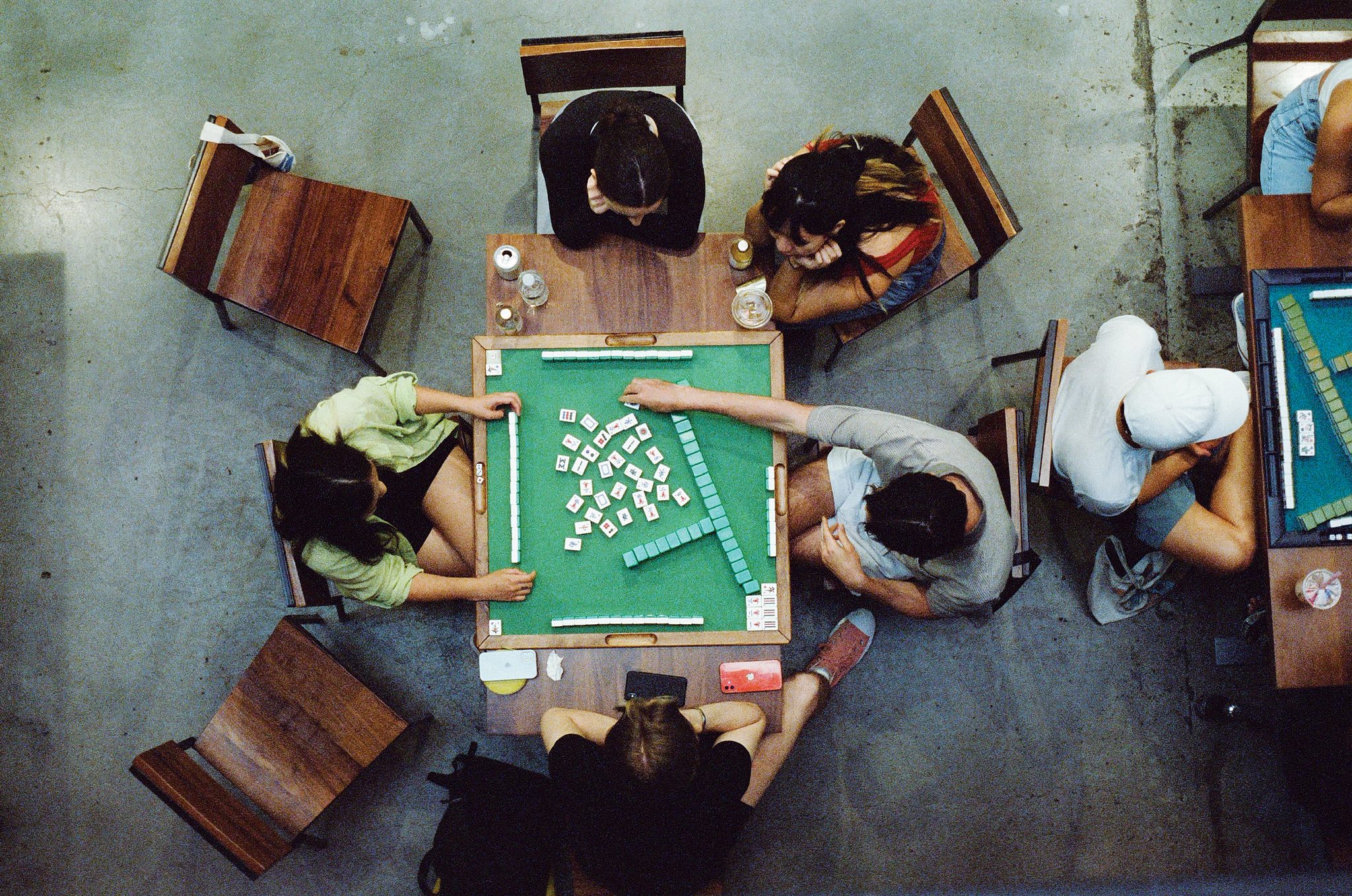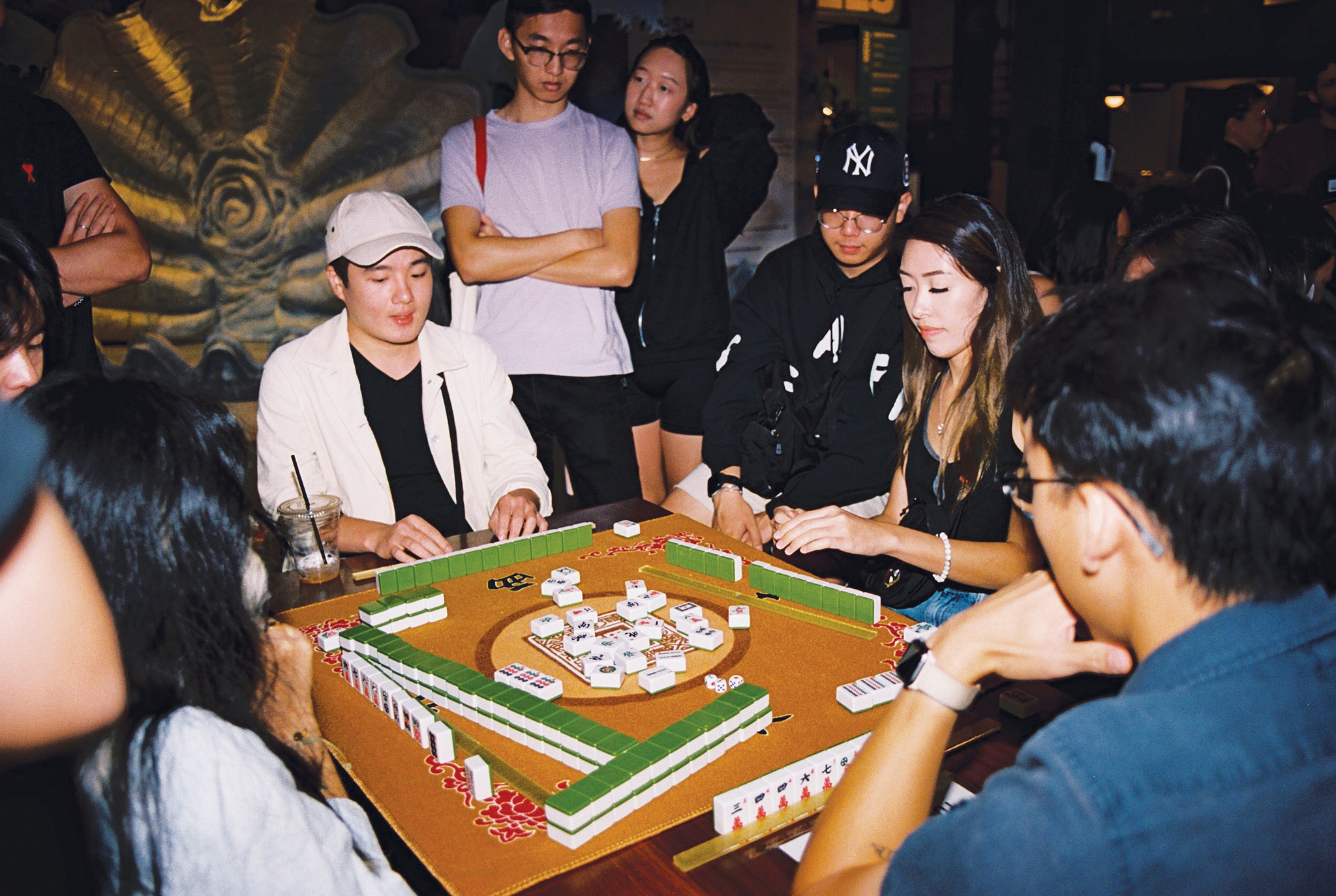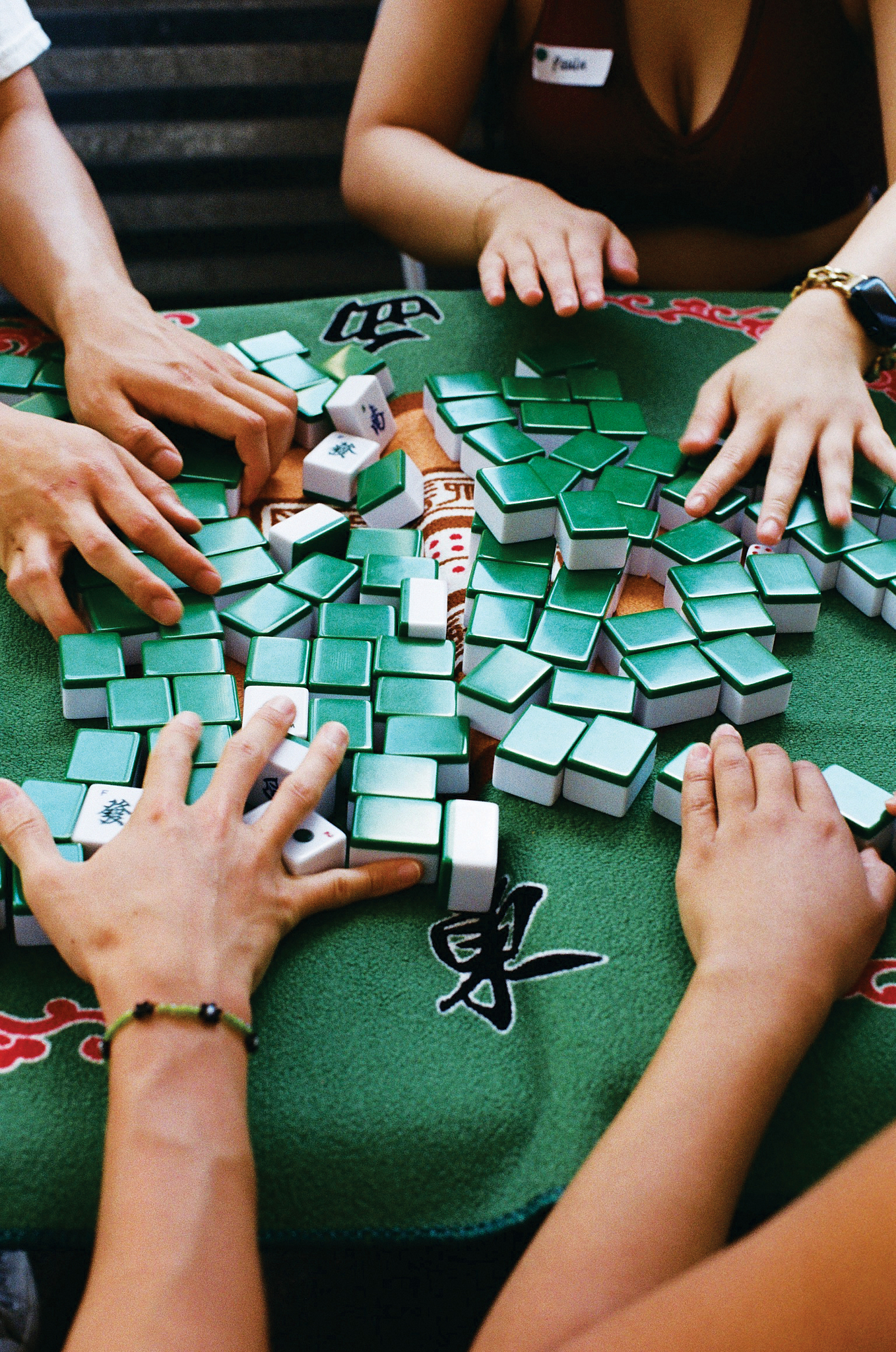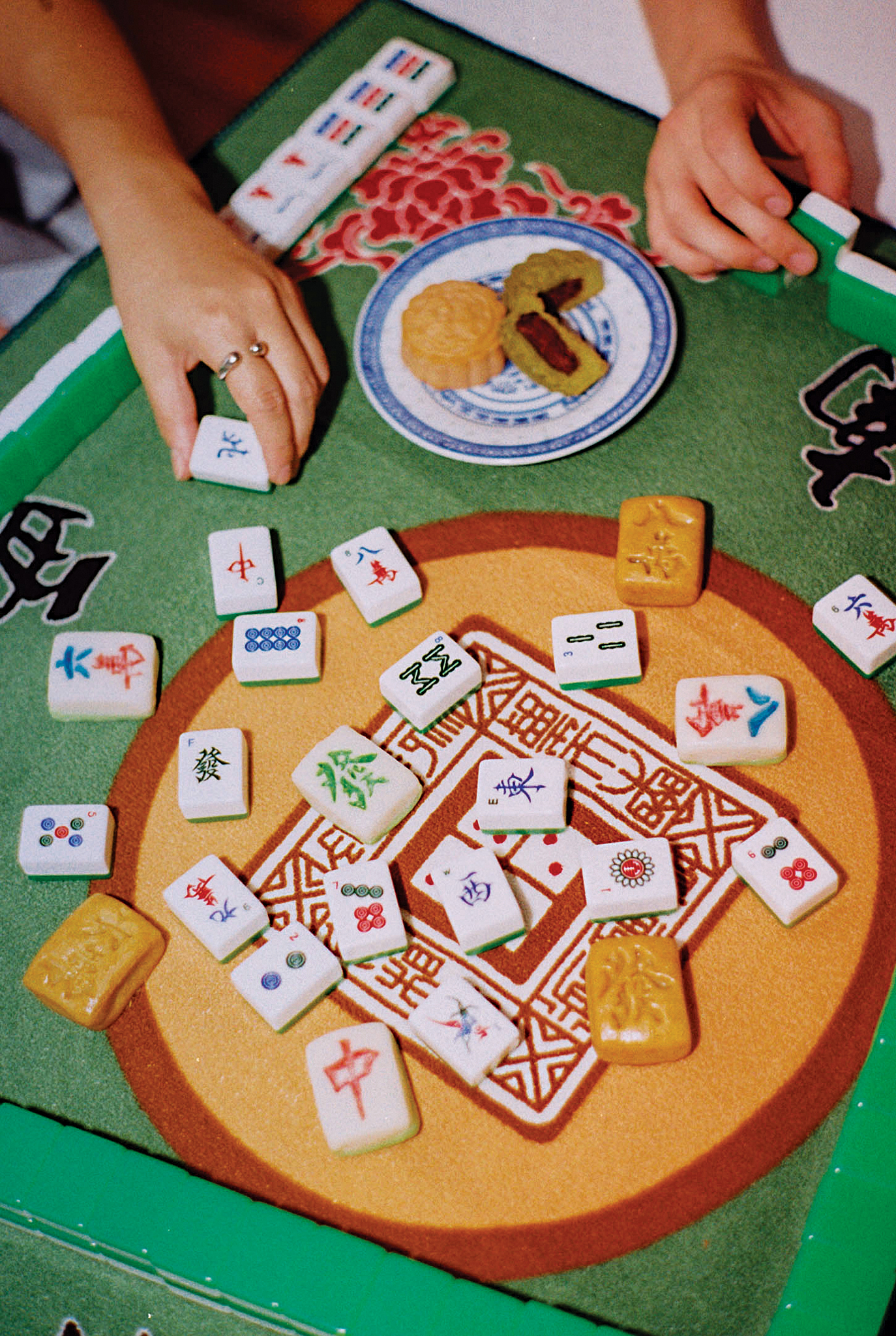Four Longhorns Are Introducing an Old Game to a New Generation of Players

On Oct. 9, 2023, four UT alumni gathered (with one FaceTiming in) at their friend’s New York City apartment in the early morning. A casual weekly game night had brought the quartet together more than a year prior, and now they awaited their feature segment on one of America’s biggest broadcast programs, the Today show. All over the country, as folks brewed their coffees and shook off their morning grog, Joanne Xu, BS ’20; Sarah Teng, BBA ’20, MS ’21; Ernest Chan, BS, BA ’19, Life Member; and Grace Liu, BS ’18, told the world about the community they have lovingly fostered around mahjong, the traditional Chinese tile game.
Xu, Teng, Chan, and Liu are the co-founders of Green Tile Social Club (GTSC), a mahjong community based in New York City that aims to embrace and celebrate Asian American culture. Ever since their first official event in May 2022, they’ve brought thousands of young people together at pop-up events across NYC. They’ve hosted celebrities such as SNL’s Bowen Yang, partnered with half a dozen Asian American businesses, and been covered by Thrillist Magazine—and now the Today show.

For the founders and the many attendees, socializing through the game has been a way to reconnect with their culture.
“Whether you’ve never touched a tile or you’ve played every single weekend with your aunties since you were young, we all have an intrinsic connection to mahjong,” Xu says. “It’s in our DNA.”
Mahjong is a four-player, tile-based game with origins dating back to 1800s China. There are typically 144 tiles with various Chinese characters and symbols on each. Three players start with a hand of 13, and the dealer starts with 14; they each draw and discard one tile on their turn. The ultimate goal is for a player to have four suits (sets of three) and a pair in their hand. The game is a popular pastime in many Asian and Asian American communities, often played at family gatherings.
On that October day, family group chats exploded with excitement and, notably, surprise. “Just watching that [Today show] video, my dad was shocked that there were so many people interested in playing mahjong in America,” Liu says. “It’s been really cool—like a mahjong renaissance.”
Despite all graduating around the same time, the GTSC founders did not know each other well before meeting up in New York. “That’s the beauty of UT,” Xu says. “There are so many fringe people that you’re acquainted with but probably will never cross paths with until some uncanny, serendipitous moment.”
Their serendipitous moment came from a callout on Chan’s Instagram looking for people in New York who wanted to play mahjong. In time, more friends became interested in playing, and the group sought out more space to accommodate the demand. Eventually, they grew to multiple monthly events and an average of 200 attendees at their flagship gatherings. Since its inception, GTSC has been the culmination of four alumni pouring their unique skills together to create a bigger community than any of them had imagined at the outset.

The team made accessibility a core consideration, both in price and approachability. The Monthly Meetup, the club’s free, beginner-friendly event hosted at Pier 57, is a common entry point for new community members. They dedicate the first hour of the event to teaching the game.
“When I was growing up, I would shadow people—sitting on people’s laps [until I] eventually earned my seat. It was like, ‘Okay, you’re good enough now and are going to play fast enough for the rest of us,’” Chan says, laughing. “[For Green Tile,] we wanted something that felt a lot more welcoming.”
GTSC specifically teaches Cantonese-style mahjong (the game is also popular in American Jewish communities and has dozens of variations throughout China and the rest of the world), though they welcome players of all backgrounds and styles.
“As kids, we used to play with our friends,” Teng says. “But as adults, there’s much less opportunity for that. I think that’s why we enjoy it so much.”

GTSC started offering ticketed events in early 2023, including Mahjong After Hours or Tiles & Tea, which are catered toward intermediate and advanced players, respectively. Teng says people in the community also started asking for even more opportunities to get to know other people—and so began Green Tile Social Hour, a series of social events that don’t necessarily center on the game.
GTSC has offered many the opportunity to reminisce on their earliest experiences with mahjong. As a child, Xu would visit her grandparents in China during the summer.
“My sister and I would just be messing around with [their] tiles, not really sure what they were. But I remember my grandma between meals coming to teach me,” Xu says. “It’s been so long since I’ve been back to my homeland. [But] those are the memories that you get to hold onto.”
Xu says she lost touch with the game for a long time, but when she finally had the chance to play again these past few years, she still remembered how. “It’s like muscle memory,” she says.
Green Tile has been a place for reunion, new friendships, and an occasional first date. All four co-founders eagerly speculate about the inevitable first wedding to come from a Green Tile connection.
“[At one] meetup, there was one person who brought her mom who was visiting,” Chan says. “The girl didn’t really know how to play, so she sat at the teaching table. And the mom was always just giving her little pointers here and there. That was a really big moment for me of seeing the power of mahjong and how it creates an opportunity to connect.”

As Green Tile events wrap up, many attendees often linger, continuing the conversation and, without the founders ever asking, helping to break everything down and clean up.
“That’s been actually really special and very heartwarming to see—our community also taking care of us,” Chan says.
While running Green Tile is not without its challenges (namely managing the time commitment and lugging their 11 sets of 144 tiles up and down subway stairs between events), the team is interested in continuing to explore pairing mahjong with social activities such as brunch, dim sum, nightlife, and more.
“We always say mahjong is such a social connector. All games are, but mahjong is everything that’s beautiful about a game,” Xu says.
CREDITS: Sarah Teng (5)





